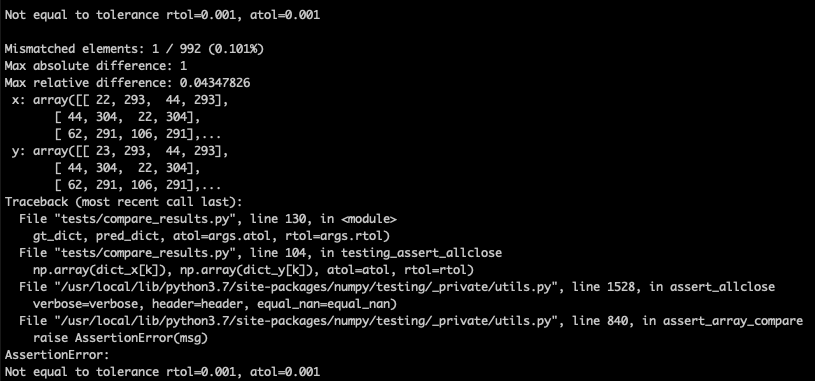# C++预测功能测试
C++预测功能测试的主程序为`test_inference_cpp.sh`,可以测试基于C++预测库的模型推理功能。
## 1. 测试结论汇总
基于训练是否使用量化,进行本测试的模型可以分为`正常模型`和`量化模型`,这两类模型对应的C++预测功能汇总如下:
| 模型类型 |device | batchsize | tensorrt | mkldnn | cpu多线程 |
| ---- | ---- | ---- | :----: | :----: | :----: |
| 正常模型 | GPU | 1/6 | fp32/fp16 | - | - |
| 正常模型 | CPU | 1/6 | - | fp32 | 支持 |
| 量化模型 | GPU | 1/6 | int8 | - | - |
| 量化模型 | CPU | 1/6 | - | int8 | 支持 |
## 2. 测试流程
### 2.1 功能测试
先运行`prepare.sh`准备数据和模型,然后运行`test_inference_cpp.sh`进行测试,最终在```test_tipc/output```目录下生成`cpp_infer_*.log`后缀的日志文件。
```shell
bash test_tipc/prepare.sh ./test_tipc/configs/ppocr_det_mobile_params.txt "cpp_infer"
# 用法1:
bash test_tipc/test_inference_cpp.sh ./test_tipc/configs/ppocr_det_mobile_params.txt
# 用法2: 指定GPU卡预测,第三个传入参数为GPU卡号
bash test_tipc/test_inference_cpp.sh ./test_tipc/configs/ppocr_det_mobile_params.txt '1'
```
### 2.2 精度测试
使用compare_results.py脚本比较模型预测的结果是否符合预期,主要步骤包括:
- 提取日志中的预测坐标;
- 从本地文件中提取保存好的坐标结果;
- 比较上述两个结果是否符合精度预期,误差大于设置阈值时会报错。
#### 使用方式
运行命令:
```shell
python3.7 test_tipc/compare_results.py --gt_file=./test_tipc/results/cpp_*.txt --log_file=./test_tipc/output/cpp_*.log --atol=1e-3 --rtol=1e-3
```
参数介绍:
- gt_file: 指向事先保存好的预测结果路径,支持*.txt 结尾,会自动索引*.txt格式的文件,文件默认保存在test_tipc/result/ 文件夹下
- log_file: 指向运行test_tipc/test_inference_cpp.sh 脚本的infer模式保存的预测日志,预测日志中打印的有预测结果,比如:文本框,预测文本,类别等等,同样支持cpp_infer_*.log格式传入
- atol: 设置的绝对误差
- rtol: 设置的相对误差
#### 运行结果
正常运行效果如下图:
 出现不一致结果时的运行输出:
出现不一致结果时的运行输出:
 ## 3. 更多教程
本文档为功能测试用,更详细的c++预测使用教程请参考:[服务器端C++预测](https://github.com/PaddlePaddle/PaddleOCR/tree/dygraph/deploy/cpp_infer)
## 3. 更多教程
本文档为功能测试用,更详细的c++预测使用教程请参考:[服务器端C++预测](https://github.com/PaddlePaddle/PaddleOCR/tree/dygraph/deploy/cpp_infer)
 出现不一致结果时的运行输出:
出现不一致结果时的运行输出:
 ## 3. 更多教程
本文档为功能测试用,更详细的c++预测使用教程请参考:[服务器端C++预测](https://github.com/PaddlePaddle/PaddleOCR/tree/dygraph/deploy/cpp_infer)
## 3. 更多教程
本文档为功能测试用,更详细的c++预测使用教程请参考:[服务器端C++预测](https://github.com/PaddlePaddle/PaddleOCR/tree/dygraph/deploy/cpp_infer)